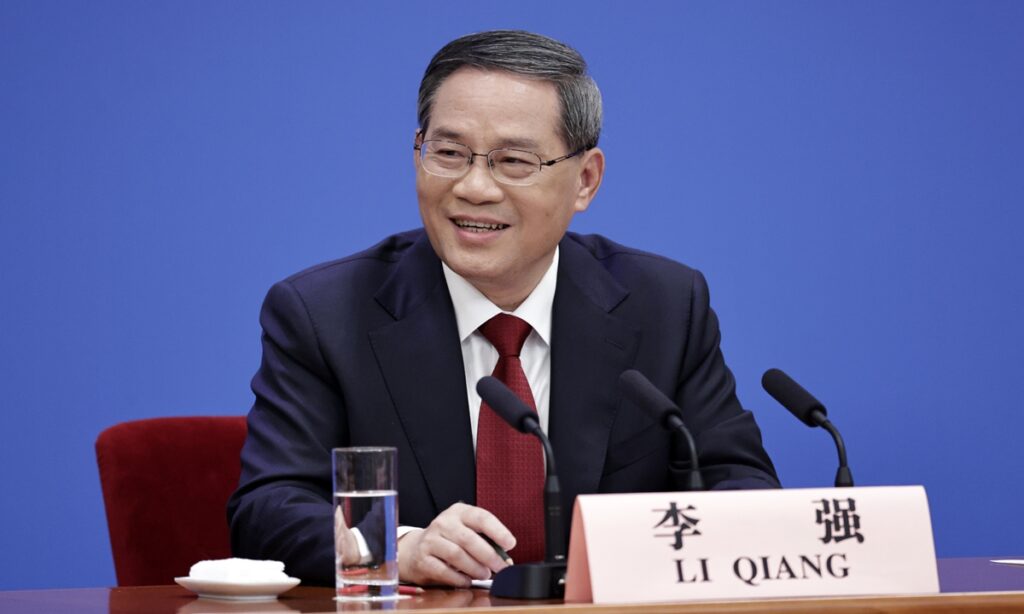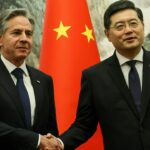Chinese Premier Li Qiang kicked off on Sunday his five-day trip to Germany and France, two major European powers and leading members of the EU. On the same day, US Secretary of State Antony Blinken arrived in Beijing for a visit that was long-expected by the US side.
This is Li’s first foreign trip since taking office in March to be the Chinese premier, with experts saying it shows that China attaches great importance to the bilateral ties with the two European countries and to the China-EU strategic ties. They noted that Li’s visit will bring more certainty for the China-Europe cooperation and will benefit the global economic recovery when the world is still in turbulence caused by the Ukraine crisis and when the US unilateralism and hegemony threaten the trend of multipolarization.
Li’s visit to Germany and France was announced by Chinese Foreign Ministry spokesperson Wang Wenbin at a routine press conference on Thursday.
Li’s visit comes after French President Emmanuel Macron’s visit to China in April and German Chancellor Olaf Scholz’s visit to China in late 2022, during which China reached fruitful cooperation and agreements with the two European leaders.
The world is deeply impacted by two pairs of relations – the confrontation between Russia and the West over the Ukraine crisis, and the US-launched great power competition against China, experts said. Under the impacts of these two factors, the EU, especially its leading members, need to find possibility from cooperation with China to break the deadlock on the Ukraine crisis and restore peace and stability for the continent, and to deal with US’ bullying that aims at undermining EU’s economic environment and potential.
China also needs to make sure the EU keeps neutral on the issues that are China’s core interests, and to seek more cooperation with European countries, especially in the fields such as science and technologies, as well as economy and trade, to balance the pressure from the US, analysts noted.
“All of these make China and the leading EU powers to share broad and concrete common interests and concerns, laying solid foundation for the further development of China’s relations with France, Germany and the EU,” Song Luzheng, a Chinese scholar residing in France and a research fellow at the China Institute of Fudan University, told the Global Times on Sunday.
For global recovery
“Premier Li has chosen Germany as the first stop of his first overseas trip since taking office. This fully shows the importance China attaches to its relations with Germany. The mechanism of intergovernmental consultation, with the Chinese premier and the German chancellor as its co-chairs, is a ‘super engine’ of cooperation between the two countries,” Wang the spokesperson told the media at the Thursday press briefing.
Li Chao, assistant director of the Institute of European Studies at the China Institutes of Contemporary International Relations, said the possible topics that could be discussed between China and Germany will generally focus on practical cooperation in the fields such as dealing with risks that could affect the economic security, the further coordination on climate change, as well as the global hot spot issues including the Ukraine crisis and the reconciliation wave in the Middle East.
At the Thursday press conference, Wang said, “Premier Li and his delegation will fully review and advance practical cooperation in various areas at the seventh China-Germany intergovernmental consultation. Premier Li will also attend the 11th China-Germany Economic and Technical Cooperation Forum and have in-depth exchanges with representatives from the economic communities of the two countries.”
Li Chao said the intergovernmental consultation is a special mechanism for Germany to interact with other major powers, and its scale is larger than the normal meeting between heads of governments, as it has more ministerial-level officials involved and more in-depth and extensive issues discussed.
In previous years, China-Germany intergovernmental consultation was postponed due to COVID-19, so this round of consultation will send a strong signal to the outside world that China-Germany exchanges and high-level government exchanges are back to normal, experts said.
Scholz is the first European leader to visit China after the 20th CPC National Congress, and Premier Li Qiang’s return visit is conducive to maintaining senior-level exchanges, Li Chao noted. He also noted that economic and trade cooperation has always been a pillar of the bilateral relations. German exports to China have declined recently, so through the talks, “we can build bridges for businesses and help restore stability in bilateral economic and trade relations.”
Germany on Wednesday unveiled the country’s first-ever comprehensive national security strategy seeking to provide an overview of the country’s foreign policy and ensure a cohesive cross-ministry approach to security, as well as to prevent Berlin from being wrong-footed by geopolitical events.
Although the document contains some strong-worded rhetoric against China, it also advocates cooperation and stressed that Germany is not seeking “decoupling” with China, which shows Berlin is being pragmatic and cautious when dealing with China when it’s also under pressure from the US, and the China-Germany ties still have great potentials, analysts noted.
For a multipolar world
Especially amid the Ukraine crisis, Paris and Berlin find that neither has enough leverage to independently deal with Washington’s bullying and pressure, so France and Germany want to find a solution by deepening cooperation with China to jointly push the multipolarization of the world order, Song noted.
With France, a permanent member of the UN Security Council and nuclear-armed power, starting to call for strategic autonomy after Macron’s visit to China earlier this year in April, Germany also stressed the importance of the multipolar world order.
According to the DW on May 9, Scholz called for “an enlarged and reformed” EU. Speaking to the European Parliament, the German chancellor said the “European Union need to change,” adding “Europe must turn to the world.” He said the world is increasingly becoming multipolar and that Europe should look for more global cooperation on equal terms.
France is now taking concrete step to promote multipolarization. From June 22 to 23, France is set to host the Summit for a New Global Financing Pact. The greatly ambitious event, which Li will also attend, is initiated by Macron, and it eyes on issues including climate change, energy, public health and how to deal with potential economic crises, according to the website of the summit.
The summit will be attended by many influential figures including UN Secretary General Antonio Guterres, German Chancellor Scholz, European Commission President Ursula von der Leyen, and many leaders from African countries. Experts said the attendance of Premier Li shows China’s strong support to France’s effort in pushing the multipolarization of the world order.
(Global Times)



